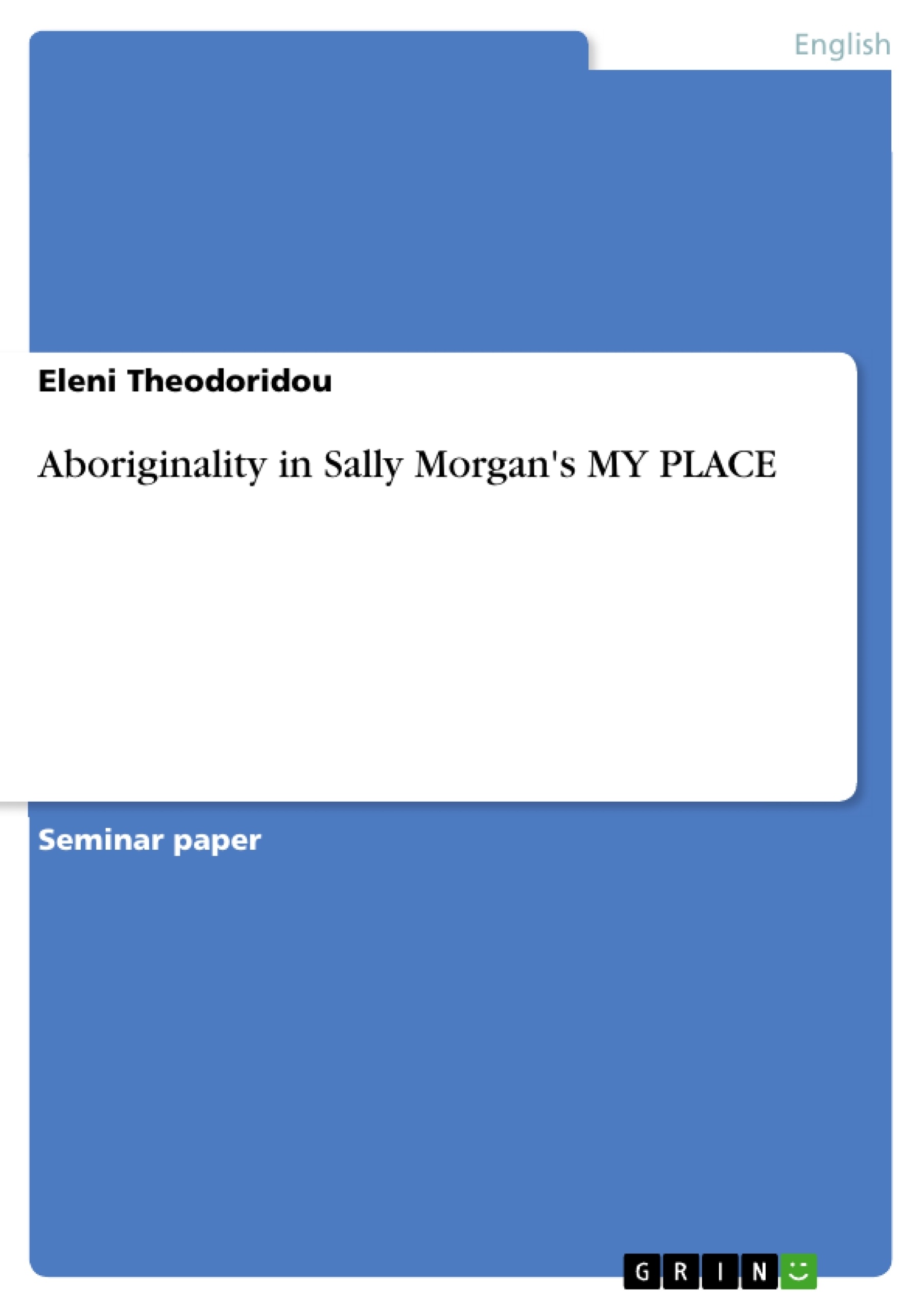Excerpt
Table of contents
1. Introduction
2. Problems of definition
2.1. “Aboriginality“
2.2. Identity
3. The ´Stolen Generation`
4. Aboriginality in Sally Morgan’s My Place
5. Conclusion
6. Bibliography
1. Introduction
The topic of my seminar work is “Aboriginality in Sally Morgan’s My Place“. In order to write about Aboriginality in this specific case it is necessary and very important to first define this term. What do we understand by ´Aboriginality`? Where does the word ´Aboriginal` come from and who/what is Aboriginal? What problem is there about identity? What was the Aboriginal past like?
Only when we have a clear concept of these terms and have a general idea about the context we can move on to the actual topic of this work, namely to analyse Sally Morgan’s (auto)biography and find out which of the aspects occur in her book and of what importance they are.
Therefore the main part of this work is subdivided into two parts: Firstly the definition of the central terms and a short historical background and secondly the analysis of the primary literature with regard to the mentioned points. Finally I will sum up the results of my research in a short conclusion.
2. Problems of definition
2.1. “Aboriginality“
Since the 17th century, when Europeans first reached Australia’s coast, until today a big problem concerning the designation of for Australia’s indigenous people exists. The problem is not easy to solve, because the ´Aborigines`, as they are called, are not homogenous people. They do not form and cannot be defined as one nation. This can be proved for example by the large number of Aboriginal languages. The name of a group is based on its collective identity, but in this case the groups which are to be named do not have one identity. The aim of a name for an ethnic group, to express an identity, does unfortunately not apply to the term ´Aboriginals/Aborigines`. This is obviously one reason why the ´Aboriginal Australian’s` refuse to accept this name and prefer to use Aboriginal names for themselves, but these are of course only used in regional contexts. At this point the other big question, namely about the ´identity`, already arises, but this will be discussed in the next chapter.
The latin meaning of the word ´ aboriginal ` is “first or earliest so far as history or science gives record“[1]. In the English language it later on adopted the meaning “primitive“ and stood for the flora, fauna and ancestral populations of different countries. Although the connotation ´primitive` disappeared and the term is written with a capital „A“, the ´Aborigines` still feel dependent and unidentified.
A lot of alternative terms emerged gradually beginning in the days of colonialism. Back then the term ´ natives` was used. Today it can be ambiguous, because sometimes Australians of European descent call themselves ´natives` when they want to emphasize that they are Australians by birth and that therefore Australia is their ´home` (,which was England for them till World War II) (cp. Schürmann-Zeggel, p.31-32).
Another term is the adjective ´ indigenous `. The problem about this designation is the lack of precision and the complications (concerning rights for these people) that arise from the UNO-definition.
Considering all these difficulties a “neutral and universal alternative“[2] does not seem to appear soon. Even ´White-Australians` became sensible towards the different names for their fellow citizens. For instance they renamed ministries and
law-texts (e.g. the ´Australian Institute of Aboriginal Studies` has been changed to ´Australian Institute of Aboriginal and Torres Strait Islander Studies`) (cp. Schürmann-Zeggel, p.33).
´ Torres Strait Islanders ` see themselves as something different than the ´Aboriginals`. They often name themselves after their home island, but there are too many islands and in many cases different spellings for one island coexist. The superordinate ´black Australians` is an attempt to combine the two groups, but it is rejected because of the racist-connotation. At political level the term ´Aboriginal and Torres Strait Islander` has developed, but it is not accepted by the ´black Australians` and there should also be a name that can be used in other coutries as well as in Australia. For this purpose non-English names are not helpful.
The difficulty to find an appropriate name and consequently to define Aboriginality does not only exist in the English language. European languages also tried to find a neutral term and also failed.
Two other designation problems are to be mentioned in this context. On the one hand the name for the Australians of European descent: ´ Whites ` is accepted by now, ´non-Aborigines` or ´non-blacks` are not appropriate, because they are not precise enough. They define what these people are not and not what they are and nobody can be satisfied with such a solution, because you cannot identify yourself with it.
On the other hand there is a great difficulty in defining people who are not 100% Aboriginal and that often occurs. The number of different descent combinations is so high that it is impossible to have a name for each constellation. For these people either terms that paraphrase their descent circumstances or the term ´ part-Aborigines ` is used. The persons concerned again cannot identify themselves, which will be discussed in the following chapter.
[...]
[1] Schürmann-Zeggel, Heinz, Life Writing, 1995, p.31
[2] Schürmann-Zeggel, p.32
- Quote paper
- Eleni Theodoridou (Author), 2004, Aboriginality in Sally Morgan's MY PLACE, Munich, GRIN Verlag, https://www.grin.com/document/46736
Publish now - it's free






















Comments